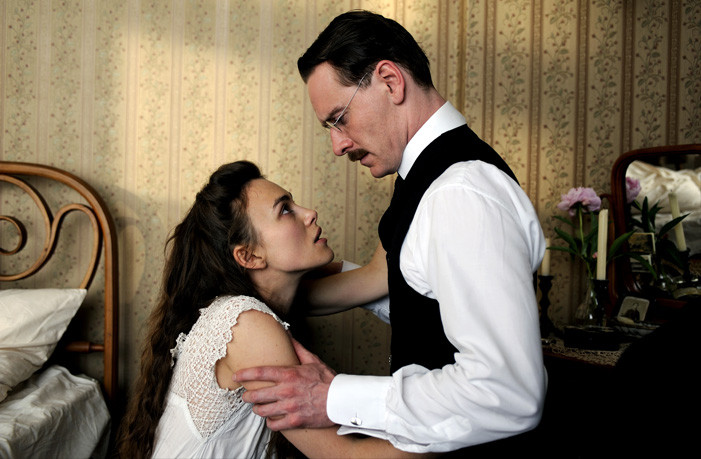 |
| Keira Knightley, Michael Fassbender, A Dangerous Method, Sony Pictures Classics, 2011. |
The influences of Sigmund Freud and Carl Jung are still being felt today, interlocked with our society's art, commerce and reason. Art and especially literature, and by proxy, the cinema, have shown the ripples of psychoanalysis most prominently. John Huston's psychedelic Freud (1962) starring Montgomery Clift has heretofore been the only cinematic respite for Freud to be featured within. Somehow fitting that a director obsessed with visualizing the psychological should choose to make a melodrama out of the crossed paths of two of psychology's most prominent thinkers.
David Cronenberg emerged from the lo-fi Canadian horror movement of the 1970s, crafting some of the most memorable horror films of that era: They Came from Within, Rabid, The Brood, Scanners, and his masterpiece Videodrome. Moving more into the mainstream with The Fly (1986), Cronenberg spent the next 25 years of his career creating some of the most singular, stimulating works of an obsessive auteur. Fixated with Bunuel, Hitchcock, and Antonioni, Cronenberg grafted his own bizarre universe onto the cultural conscience, swathing body fear in rapturous visuals and creeping stories of psychosis and unseen terror. In his more recent phase, Cronenberg has made more austere (for him) psychological dramas, the masterpieces Spider, A History of Violence, and Eastern Promises.
How fitting, as I observed, that his newest film is a (melo)dramatization and subsequent investigation into the private lives of two of the most famous men in all psychology.
Cronenberg sweeps us into an intimate, claustrophobic world where Dr. Jung (a once again pitch-perfect Michael Fassbender) slowly becomes awed by his unhinged patient (Keira Knightley, intense) at the expense of his faithful wife (Sarah Gadon). Dr. Freud (Viggo Mortensen, brilliant) begins to spar thoughts with Jung, which culminates in the great rift in psychological circles. What is intersting is how Cronenberg and writer Harold Pinter, adapting his own play, allow this crucial aspect to take a backseat to a transformative love story.
The period is captured alarmingly well, down to the smallest detail. Cronenberg's pacing and framing have never been better, but its his grasp on the binding essence of the picture which is awe-inspiring. Peter Suschitzky lights the proceedings with a grave palette of splendor, while Howard Shore composes one of his most layered, moving scores in some time. All of these ingredients dissolve as do the desires of his triangle of bodies and minds.
No comments:
Post a Comment